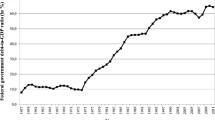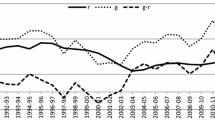Abstract
In this paper, we investigate the trade-off between the need for budget consolidation and the desirability of expansionary fiscal policies as a means of demand management by simulating alternative scenarios with a macroeconometric model of the Slovenian economy. The simulations show that for the Slovenian economy, an expansionary fiscal policy is neither feasible nor desirable: it leads to unsustainable government debt and has only weak effects on income and employment. It turns out that the stability program of the Slovenian government and the related policy prescriptions of the EU lead to reasonable results in terms of public debt without strong adverse effects on output or unemployment. An expansionary fiscal policy is not desirable, as it results in unsustainable public debt without enhancing employment and output sufficiently.









Similar content being viewed by others
References
Blueschke, D., Blueschke-Nikolaeva, V., Neck, R., & Weyerstrass, K. (2012). Macroeconomic policies for Slovenia after the “Great Recession”. Eurasian Economic Review, 2(2), 54–93.
Braniselj, S. (2011). Slovenija in dolzniska kriza (Slovenia and sovereign debt crisis). Bancni Vestnik, 60(10), 10–13.
Coenen, G., Mohr, M., & Straub, R. (2008). Fiscal consolidation in the euro area: long-run benefits and short-run costs. Economic Modelling, 25, 912–932.
Coenen, G., et al. (2012). Effects of fiscal stimulus in structural models. American Economic Journal: Macroeconomics, 4(1), 22–68.
Cogan, J. F., Cwik, T., Taylor, J. B., & Wieland, V. (2010). New Keynesian versus Old Keynesian government spending multipliers. Journal of Economic Dynamics and Control, 34, 281–295.
Fenz, G., Moder, I., & Silgoner, M. (2012). Sovereign debt crisis delays economic recovery. Monetary Policy and the Economy, Q3, 5–22.
Neck, R., Blueschke, D., & Weyerstrass, K. (2011). Optimal macroeconomic policies in a financial and economic crisis: a case study for Slovenia. Empirica, 38, 435–459.
Neck, R., Blueschke, D., & Weyerstrass, K. (2012). Macroeconomic policies for Slovenia in the “Great Recession”. International Advances in Economic Research, 18, 345–366.
Republic of Slovenia (2013a). National reform programme 2013–2014, Ljubljana; online at http://www.mf.gov.si/fileadmin/mf.gov.si/pageuploads/docs/Razvojni_dokumenti/20130510_NRP_2013_ENG.pdf, May 9th 2013.
Republic of Slovenia (2013b). Stability programme 2013 update, Ljubljana; online at http://www.mf.gov.si/fileadmin/mf.gov.si/pageuploads/tekgib/Stability_and_Convergence_Programmes/20130510_stability_programme_2013_ENG.pdf, May 10th 2013.
Taylor, J. B. (2009). The lack of an empirical rationale for a revival of discretionary fiscal policy. American Economic Review, 99, 250–255.
Weyerstrass, K., & Neck, R. (2013). A young EU member’s ageing: budgetary and macroeconomic consequences of Slovenia’s demographic prospects. Empirica, 40, 427–456.
Acknowledgments
An earlier version of this paper was presented at the 75th International Atlantic Economic Conference in Vienna, Austria, April 3–6, 2013. The authors also gratefully acknowledge financial support from the EU Commission through project MRTN-CT-2006-034270 COMISEF and from the Jubiläumsfonds of the Oesterreichische Nationalbank (project no. 12166).
Author information
Authors and Affiliations
Corresponding author
Rights and permissions
About this article
Cite this article
Neck, R., Blueschke, D. & Weyerstrass, K. Trade-Off of Fiscal Austerity in the European Debt Crisis in Slovenia. Int Adv Econ Res 19, 367–380 (2013). https://doi.org/10.1007/s11294-013-9438-8
Published:
Issue Date:
DOI: https://doi.org/10.1007/s11294-013-9438-8




